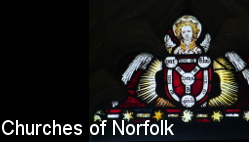| |
|
All
Saints, Tibenham Norfolk is so rural that between Diss and
Wymondham the villages just disappear into the woods and
rolling fields, but if you ever wanted to find Tibenham
in a hurry, you'd need do no more than look for the tower
of All Saints. In a part of the county where churches
tend to be small and round-towered, this one is huge, a
vast 15th century sentinel that dwarfs the little village
around it. The tower is at the highest point in the
parish, and is a beacon to this part of south Norfolk.
That said, the tower itself is not particularly
attractive, because the eastern face is sheer, dwarfing
the building beneath. Perhaps a rebuilding of the nave
was planned, or more likely the tower was simply intended
to impress. The body of the nave and chancel are only
slightly before the tower, although there's some evidence
of the earlier church that they replaced. The starkness
of the north side, which has no aisle, matches the tower.
The austerity of the whole piece is accentuated by the
narrow sleeve of the churchyard, making this a difficult
church to photograph. The great yew tree immediately to
the east of the church doesn't help, of course.
But stepping inside, the interior is light and crisp, a
thorough 19th century restoration giving it a wide, open
feel, much larger than the nave appears from outside.
Neither Mortlock or Pevsner thought much of the
scriptural quotations in banners around the wall, but in
truth they give the church a bit of the character it
cries out for. It is easy to be critical of the
Victorians, and we need to remember that many large
churches were in a parlous state by the early 19th
century, but in truth it is so rare to find a church this
big that still has the rustic feel that they worked so
hard to eradicate.
But Tibenham church feels loved and well-used, which is
what really counts if it is to continue as a living,
working church. And it is not without interest, for it
includes something very unusual indeed. This is the
Buxton pew, an early 17th century enclosure raised some
two metres above the east end of the south aisle. There
are several raised pews in Norfolk, the Astley pew at in
the south transept at Melton Constable for example, and
the Chadd pew in the south aisle at Thursford both spring
to mind. But those are both raised over the family crypt.
This is the only one you can actually walk beneath.
You get to it by a staircase which turns up from the east
end of the aisle, and when you get inside you are likely
to see as much woodwork as anything going on below. It
probably wasn't intended as a family pew at all, but as a
place for the Buxton servants to sit. The Buxton arms are
on the north side, and a Buxton hatchment hangs on the
west.
The Buxton pew is by no means the grandest piece of
woodwork in All Saints. This accolade must go to the
pulpit. It towers a good four metres above the north-east
corner of the nave, its tympanum like a a huge, elegant
crown. I don't usually mention moveable furnishings on
this site, but this is so vast that it could never be
removed. It must have been put together in situ.
A recent plaque remembers the 445th Bombardment Group of
US Air Force which flew from Tibenham airfield, today
mainly used by gliders. The traceried font sits nearby on
its colonnade at the west end of the nave and looks very
fine, particularly in this open space. And just beyond
the Buxton pew hide the royal arms to George I. Still in
their original frame with its curling supports, they have
been bleached to a silvery grey by the passing of the
years.
Simon Knott, August 2018
|
|
|
